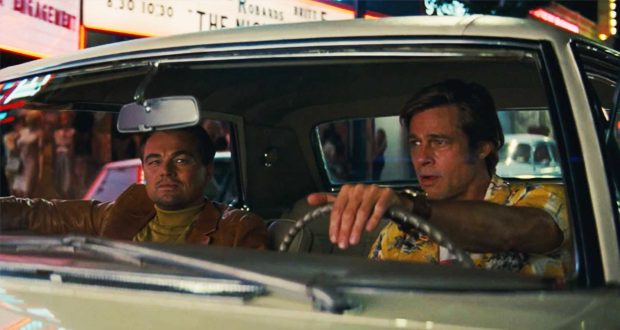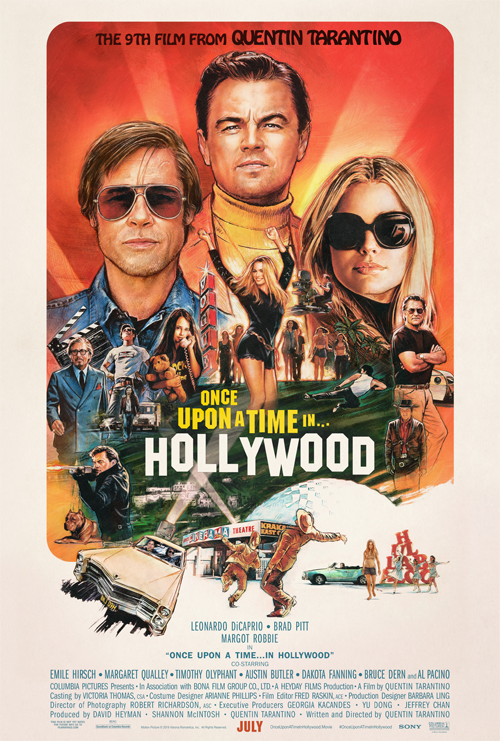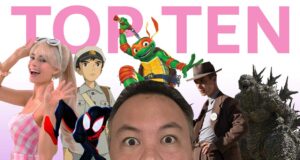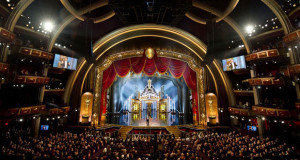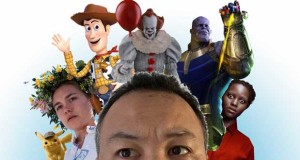Director: Quentin Tarantino
Writer: Quentin Tarantino
Cast: Leonardo Di Caprio, Brad Pitt, Margot Robbie, Margaret Qualley, Timothy Olyphant, Al Pacino
When considering the style, language and tone of Quentin Tarantino’s films and how much they wear the influence of Sixties and Seventies exploitation films on their sleeve, its surprising to realize that its taken this, Tarantino’s ninth film, to actually set a story in that actual era.
In the final years of the Hollywood golden age of cinema, Once Upon A Time In Hollywood follows the fortunes of Rick Dalton (Di Caprio), an aging tv actor who feels the sun is setting on his career, and Cliff Booth (Pitt), his loyal and long serving stunt double. They have a working relationship that is unique to that era of movie making. In modern cinema, actors and their stunt doubles chop and change from movie to movie but in the past, it was more common for actors and their stunt partners to form long term collaborations, moving from project to project together.
We learn from the outset that not only does Booth work as Dalton’s stunt double, he is also a friend, a minder and occasionally a therapist. Their unique bond is at the heart of Once Upon A Time In Hollywood, a fanciful and painstakingly crafted tale about underappreciated and unsung heroes of a bygone era, set against the backdrop of the infamous murder of Sharon Tate at the hands of the Charles Manson cult. The film moves along at a leisurely pace, clocking in at 2 hrs 45 min, with scenes playing out as a Slice of Life peek into Rick Dalton’s midlife crisis as he frets over whether he can ever make a successful transition from television actor to leading man in film.
Paradoxically, the film is both a relaxing and enjoyable ride in the company of two friends and also an increasingly stressful viewing experience. Individual scenes and unexpected moments of tenderness will delight the viewer, such as Dalton’s bond with child actor Trudi who helps him rediscover his confidence as a performer, but there is an unease and dark cloud over the entire proceedings because we know as the story unfolds, we move ever closer to the night of the Tate murder.
Speaking of Tate, much has already been written of Margot Robbie’s performance in Once Upon A Time In Hollywood and the scant number of lines she has been afforded in her performance. I was a little dubious about how her part would come across (could Tarantino really write the character with the tact it deserves?) but I ended up being happily surprised by what I saw. Robbie’s Tate is kept at arms length from the viewer in a way that maintains an air of mystique but we get a pretty good sense of who she is – a young, little known actress with her whole life ahead of her. We see Tate with her friends at a party, listening to records in her home and watching her own performance in a movie theatre, unrecognised by the audience around her. It’s this scene in particular, where we watch Robbie’s reactions to both her own on-screen performance and the people around her, that most effectively communicates to the audience who she is.
The rest of the cast is universally excellent too. Di Caprio is terrific as Dalton, a blustery performer whose on-screen swagger masks a growing sense of anxiety and fear that his time is up. I’ve also never seen a film that has squared up the lens on Brad Pitt such as this, with close up shots that show wrinkles and an aged complexion. In a time where modern cinema seems determined to pretend Tom Cruise is still in his early thirties, Once Upon A Time In Hollywood is notable for making fifty five year old Brad Pitt look fifty five. He delivers his performance with a cheerful Southern drawl that is charming, disarming and a perfect counter balance to Dalton’s nervy disposition.
All this is of course delivered in the stylish trappings we’ve come to expect of a Tarantino production. The soundtrack, set design and costumes are spectacular and show an affection for the subject matter that few movie makers can rival. You’ve seen plenty of modern films recreate the Sixties and still, I bet few would come close to matching the eye for detail that Tarantino pours into Once Upon A Time. It’s in the radio jingles that play in the cars, the close up shots of cans of dog food, the footwear, the home decor and countless other little micro details he casts the lens on.
Once Upon A Time In Hollywood is one of Tarantino’s most disciplined films in recent memory. A lot of Taratino’s cinematic indulgences – lengthy speeches from characters discussing popular culture, gratuitous use of racial slurs, random acts of violence – are noticeably absent or scaled back in this production. In that sense, I think a lot of people have favourably compared the film to Jackie Brown which I think is fair and reasonable.
There is an enjoyable centre to Once Upon A Time – the friendship between Dalton and Booth – and swirling around that are countless themes about aging, media portrayals of violence, the cultural revolution taking place in the Sixties to name a few. It is a film of considerable heft with plenty of ideas you can sink your teeth into.
Tarantino has heavily implied he is close to wrapping up his film career. He has previously said he would like to retire at 60 and the man is now 56 which suggests he might have just one last production left in the tank. Whether that ends up being true or not, Once Upon A Time In Hollywood represents a high point in the late stage of his career. It is easily his best work since Inglorious Basterds and I found myself thinking back on the film, days after I’d seen it.
Review Overview
REVIEW
GREAT
Summary : Once Upon A Time In Hollywood is Tarantino's best film in many years and the focused, disciplined film-making harkens back to the excellent Jackie Brown.
 The FAT Website est. 1999
The FAT Website est. 1999

